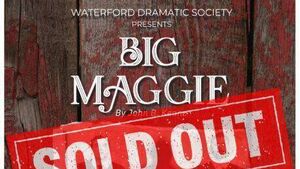View from the Green Room: Magnificent Maggie… 'I just wanted it to go on longer'

Big Maggie
There’s a reason that Maggie Polpin is called Big Maggie. She’s had it tough. An attractive young woman marries a monster and she’s borne the brunt of it all her wedded life of a quarter of a century.
She’s had to hang tough and she’s battle hardened. A Rottweiler in an apron.
When the funeral rosary, led by John Thompson ends, we find that womaniser, drunkard and wife-beater Walter Polpin has died. He’s run the family business into the ground and all he’s left is a parcel of debt. Maggie has finally got the run of the shop and farm. She is determined to run the business with an iron fist and her four children, reared in the expectation of inheritance, are destined to learn bitter lessons from a heartless matriarch.
One by one, Maggie denies them their inheritance and crushes their hopes; driving each in turn away believing that hardening them is the only way they’ll fend for themselves.
While each harbours romantic notions, love for Maggie was a bitter experience and marriage is a financial contract. Finally free, Maggie does as she wishes and sentiment never enters into it.
Big Maggie has always been my favourite Keane character. A complex character, she despises any cultural or religious role that society attempts to impose on her. Her new life is really a revenge for the way she has been treated in a culture where parochial hypocrisy and smothering matriarchy is the norm.
Big Maggie takes no prisoners as she asserts her right to determine her financial, economic and family future. The grim circumstances of her children’s fate and the manner in which she threatens, intimidates and beats them make her a frightening and repelling character.
John B delighted amateur drama societies with his big cast shows that attracted big houses. There was a part for everyone in the audience and an audience for everyone in the part. Keane’s gift was in creating rural real flesh and blood characters that everyone could identify with.
As always with John B’s work, these minor characters fascinate. Paul Dillon and Jacqui Power delight as busy nobodies that emphasise the shallowness of rural life.
Paul Barry is superb as the aging and lonely undertaker Byrne who is desperate for marriage but routinely humiliated by Maggie.
Luke Corcoran is suitably suave and sneaky as the cute-hoor salesman Teddy Heelin, who has designs on Maggie’s youngest, and, also, on the widow herself. Teddy learns to his cost that you would want to be up very early in the morning to fool Maggie out of her fortune or her daughter.
Jennifer Cosgrove and Catherine Bradley make up the Madden family who have designs on marrying into the farm and displacing Maggie. Dream on!
Bryan Costello is angry eldest son Mick Poplin who demands but is denied his due in the share of the farm and the business. Kassie O'Mahony is the innocent and likeable Gert who ends up nursing in England; Chloe Dalton - O’Neill - is a feisty Katie who is forced into marriage with an older man when Maggie realises that she’s pregnant, and Steven Walsh is excellent as frustrated younger son Maurice denied the farm he has worked all his life.
Denise Quinn is magnificent as Big Maggie. She towers over all and sundry in an acting masterclass. This is not a story about revenge but one of loneliness. It’s about what happens to the human soul if it is isolated, twisted, and scorned. One by one she pillories each of her children on a scaffold of physical and mental abuse that destroys their confidence and drives them for the boat.
The boys are sneered at for their inability to stand up to their father, while Maggie’s slap across Gert’s face brings gasps from the audience. Later, when Maggie drags Katie to her knees by the hair of her head and threatens to break the sweeping brush on her back, nobody doubts she means it. You could touch the fear in Garter Lane.
Worst of all, Denise’s Maggie convinces that there is a lot of truth in what she has to say. Like most simple country-folk, Maggie Polpin is a complex individual. Maggie has been wronged and humiliated for a quarter of a century and understands the ways of the world far better than her gormless children. Her bitter, confrontational manner has driven them all away and forced them to man up.
But it’s been a bitter lesson for everyone – including Big Maggie.
Director Frieda Ryan gets every aspect of this play spot on. Michael Oates’s lighting design facilitates acting pods; costumes, set and props are straight out of rural Ireland sixties and the choice of link music breathes a commentary that is evocative and, ironically, romantically nostalgic.
Frieda’s pace is just right. The play never stands still for a second, which is part of its strength. Something is always happening as the narrative pounds along. “I just wanted it to go on longer” commented one lady on the way out.
Congratulations to the WDS on reaching nine decades of presenting amateur drama to the people of Waterford. I’m proud to say that I performed in 10 WDS plays and I learned the discipline and craft of theatre from those productions.
Hopefully, we’ll all get to see the WDS centenary.






